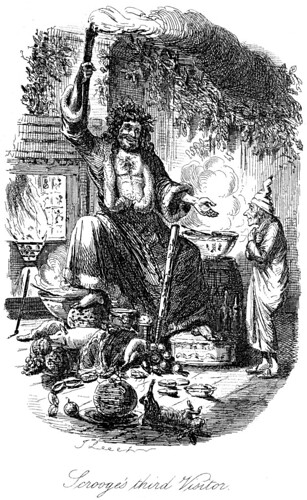 |
| Scrooge at one of our performances of Dickens' story |
The spirit of Christmas Past - friends and loved ones no longer with us, the children who were Tiny Tims and have now gone off to college, the years we did 14 performances, the years snow prevented even one, the era of performing the story at the local AIDS hospice until one day it was no longer necessary, and so many more. Every phrase I've just written is connected like a fine gold filament to a deep, rich, true story woven into my heart - some joyful, some wrenching, and I wouldn't trade a single one.
The spirit of Christmas Present - embodied in every friend who came to celebrate with us last night, new faces and familiar faces, the laughter and conversation and food and drink, the preparations, the last lingering musings late into the night, even the clean-up - as well as the many moments of human connection this week with my students at school, my colleagues, my friends and family near and far. Again - not all of it happy, but all of it so real and true and enriching in the best sense of the word.
The spirit of Christmas Future - the knowledge of mortality, which becomes ever more real with each passing year, as friends and family shuffle off this mortal coil. Scrooge's redemption doesn't mean he won't die. We all die. Dickens' Christmas Future is frightening, yes, and yet Scrooge says he will live with that spirit, too, and it is that spirit, that awareness of how "any spirit working kindly in its little sphere will find its mortal life too short," that ultimately brings about Scrooge's fullest change of heart and his commitment to a different path.
We are here on this earth for but a blink of the divine eye. Most of us don't consciously carry that knowledge of impending mortality with us all the time. It's too much too bear. It must be tempered by the spirits of Past and Present. But it must be somewhere in our minds and hearts, for it drives us, too. It drives us to remember what truly matters. What legacy do we wish to leave? How do we wish to be remembered? How shall we live while we are here? Will we connect with our fellow human beings? Will we honor and cherish what we learn from our past, embrace our present regardless of our circumstances, and be cognizant of our future?
Scrooge doesn't say the spirits of all three will co-exist peacefully, mind you. He says they will strive within him. Miriam Webster defines strive as "struggle in opposition" or "endeavor." I think "struggle in opposition" fits here. The three spirits contend with one another, and out of that struggle comes a potent energy for good. It's very much in keeping with the Christianity I know and love, a religion born out of struggle, a religion in which sorrow and joy, death and rebirth, God and man commingle. It is Jacob wrestling with the angel.
Long live the power of struggle! May the spirits of past, present and future strive within all of us to drive our best selves and illuminate all that it means to be human.


